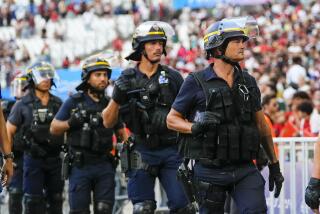Address Book Leads to Basque Terror Leaders
- Share via
MADRID — About ten days ago, a Basque terrorist bomber living on the run forgot his address book in a phone booth. As a direct result, Spain will probably be a safer place this summer for millions of visitors to the Summer Olympics in Barcelona and the World’s Fair in Seville.
That was the jubilant public reaction here Monday to continuing police raids in the Basque region of France and Spain that have dealt a crippling blow to the separatist group ETA, whose terrorism has claimed more than 700 lives since 1968.
“This is the best news we’ve had in years,” said conservative leader Jose Maria Aznar in a view echoed by Spanish newspapers and leaders across the political spectrum. Official Spain was no less pleased but publicly more cautious.
In a right-from-the-movies raid Sunday, elite anti-terrorist French police surprised ETA leaders holding a summit meeting at a private home in the small town of Bidart near Biarritz in the Basque region of southwestern France.
Without firing a shot, they arrested the ETA’s commander and chief strategist, the movement’s leading ideologue, its foremost explosives expert and a handful of the group’s small fry.
The terrorists were frantically trying to destroy documents when the French raiders burst in, Spanish police said. The French recovered most of the documents in the most spectacular example of cross-border collaboration in the long and sometimes strained Spanish-French struggle against the ETA.
Police reported the follow-up arrest Monday of five presumed ETA members in the northern Spanish city of Bilbao in the wake of the Sunday strike that Spanish police said was made possible by an address book lost in Barcelona by a member of an ETA cell whose bombings across Spain have killed 18 people so far this year.
The ETA “has been decapitated,” French Interior Minister Philippe Marchand said after Sunday’s raid, the single most damaging strike ever delivered against the separatists. The ETA’s dream of creating one independent country from the Basque-speaking regions of Spain and France enjoys minority political support among Basques in Spain but almost none in France.
Meeting reporters here Monday, Spanish Interior Minister Jose Luis Corcuera was also upbeat--to a point.
“This is not the time for euphoria,” Corcuera declared. “ETA is still capable of causing pain and death. We must continue fighting with the same determination.”
The ETA, an acronym for Basque Homeland and Freedom in the Basque language, opened 1992 with its bloodiest attacks in a decade. Seeking to coerce the Madrid government into negotiations, the ETA threatens to target the Olympics and the World’s Fair, the crown jewels of Spain’s yearlong national fiesta celebrating the 500th anniversary of Columbus’ voyage west.
Up to 15 million visitors are expected at Expo ’92 in Seville beginning April 20. The Olympics will draw perhaps 500,000 visitors for a two-week run beginning July 25 in Barcelona.
Police promise that the Games and fair sites will be safe, but they say it is impossible to protect against a car bomb--an ETA trademark. Security precautions for events will not be relaxed in light of the arrests, Corcuera said.
While individual ETA cells, particularly the so-called “traveling commandos” responsible for most of the 1992 attacks, have the ability to function without central command, the terrorists were hurting even before Sunday’s developments. A raid by Spanish police earlier this month on an ETA safehouse not far from Barcelona also netted information that helped investigators pinpoint the weekend summit, Interior Ministry sources told Spanish reporters.
More than 40 suspected ETA members have been arrested so far this year, joining about 600 others already in jail.
To them now is added 39-year-old ETA leader Francisco Mugica Garmendia, alias Artapalo, who was Spain’s Public Enemy No. 1.
With him at the summit meeting--”they were not discussing flowers,” said one French policeman--was Jose Luis Alvarez, alias Txelis, the ETA’s ideologue, and Joseba Arregui Errostarbe, alias Fitipaldi, whom police called the dean of ETA bombers and the man who was apparently also in charge of logistics.
The three formed the movement’s three-man “executive committee,” according to Spanish sources familiar with ETA’s structure.
More to Read
Sign up for Essential California
The most important California stories and recommendations in your inbox every morning.
You may occasionally receive promotional content from the Los Angeles Times.













